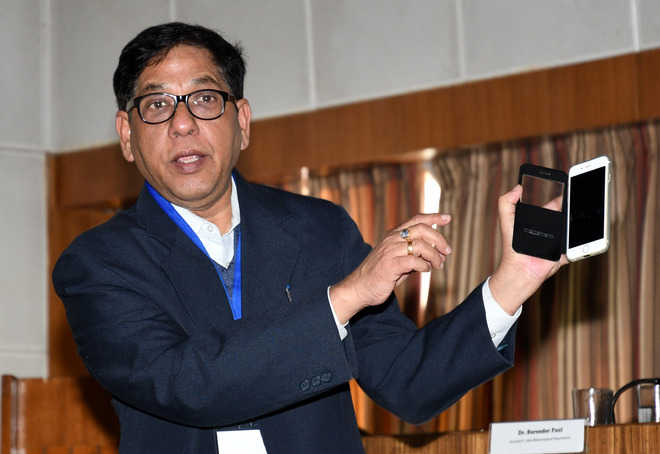
Prof Mukesh Khare from the IIT-Delhi at the PU. Pradeep Tewari
Tribune News Service
Chandigarh, December 7
“Delhi is like a washbasin which sucks all the pollution from the neighbouring areas,” said Prof Mukesh Khare from the Indian Institute of Technology (IIT)-Delhi at Panjab University, here today. He was here to deliver a keynote lecture during the three-day residential training programme on ‘Air Pollution and Human Health: Case Studies’.
He further said due to reckless construction in Delhi, the air ventilation coefficient was low. “The pollution rests in on Delhi and air doesn’t move,” he said. He said to better plan the air pollution control in Indian cities, first step was to identify the major sources of air pollutants using source apportionment techniques. Further, he stressed that air pollutants might have different sources in different cities so source apportionment studies should be conducted for better control of air pollution.
The programme is being organised by the School of Public Health, PGI, in collaboration with the Department of Environment Studies, PU, and is sponsored by the Central Pollution Control Board, Delhi, and the Department of Health Research, Delhi.
Over 50 participants, including public health practitioners, medical professionals, pollution control board representatives, environmentalists, attended the training programme. The programme will raise awareness about air pollutants, exposure pathways and health effects to better plan the air pollution control strategies and their implementation to reduce the burden of air pollution related deaths and diseases.
Surender Paul, Director, Indian Meteorology Department, handigarh, inaugurated the training programme and highlighted that air pollution couldn’t be ignored and immediate steps were needed to reduce the air pollution.
Dr Ravindra Khaiwal, organising secretary and Associate Professor of Environment Health, said the workshop aimed to build capacity of participants to better measure the air pollutants and plan health risk studies in their respective states as an aid to policy measure.
Dr Suman Mor, coordinator, Centre for Public Health, said the programme provided an opportunity to scientist, policy makers and administrators to learn and share best practices to better plan air pollution control strategies in their respective cities.
Dr Sreekanth, University of Washington, Seattle, explained how long-term and short-term exposure to air pollutants could be linked to a range of adverse health effects such as respiratory infections or cardiovascular diseases.



























